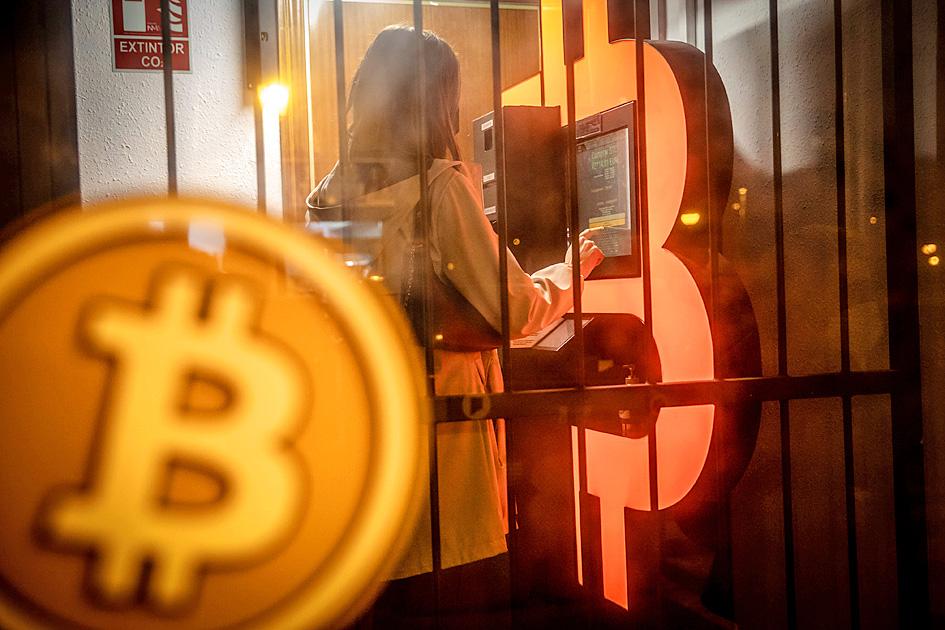Providers of automated teller machines (ATMs) that allow people to purchase cryptocurrencies with cash have to comply with anti-money laundering (AML) regulations and conduct know-your-customer (KYC) practices, or face a penalty, the Financial Supervisory Commission (FSC) said yesterday.
The FSC made the remarks following a nearly month-long investigation after Chinese Nationalist Party (KMT) Legislator Lai Shyh-bao (賴士葆) on Dec. 23 raised questions about the machines’ operations during a meeting of the legislature’s Finance Committee.
The commission found that there are at least 24 bitcoin ATMs in Taiwan, which are operated by different companies for different purposes, Banking Bureau Chief Secretary Phil Tong (童政彰) said.

Photo: Bloomberg
One of the operators was among the 16 virtual-asset service providers that have reported to the commission about their compliance with AML regulations and practices, while the others are not regulated, he said.
“Some providers of those ATMs use the machines not as a tool to boost trade, but for marketing campaigns. They assign employees to tell people how to open an account at the companies’ digital platform to trade virtual coins online,” Tong said.
“However, we found that some ATMs allow consumers to trade cryptocurrencies without [the company] following KYC practices. Such providers might have contravened AML regulations,” he said.
The commission will ask the providers to work on AML compliance and failing that, they might be fined NT$500,000 (US$18,092) or more, he said.
In related news, the commission yesterday tweaked its regulations on security token offerings (STOs), but did not raise the fundraising limit of NT$30 million, despite calls from interested parties.
Companies wishing to raise more funds would still have to apply to run an experiment in the regulatory sandbox, the commission said.
“Companies that aim to raise more than NT$30 million are not small and they can raise funds via regular channels, such as an initial public offering,” Securities and Futures Bureau Deputy Director-General Kuo Chia-chun (郭佳君) said by telephone.
“As STO is a new fundraising mechanism and bears more risks, it is appropriate that STOs apply only to small companies,” Kuo said.
No company has filed for an STO since the regulations took effect in January 2020, data from the commission showed.
The commission has no plans to regulate non-fungible tokens (NFT) for the time being, as it does not consider the tokens securities, even though they have gained popularity in Taiwan lately.
“Although people can raise funds by launching NFTs, as they can by issuing bonds or shares, and tokens can be traded like bonds or shares, they are still different from the two main types of securities,” Kuo said.
NFTs are not issued to fund an operational project or business, but are issued as a digital certification of works of art, so the commission considers it more like a real product than securities, she said.
The commission would investigate any suspicious fundraising activity if investors file a report about being scammed, she added.

STEEP DECLINE: Yesterday’s drop was the third-steepest in its history, the steepest being Monday’s drop in the wake of the tariff announcement on Wednesday last week Taiwanese stocks continued their heavy sell-off yesterday, as concerns over US tariffs and unwinding of leveraged bets weighed on the market. The benchmark TAIEX plunged 1,068.19 points, or 5.79 percent, to 17,391.76, notching the biggest drop among Asian peers as it hit a 15-month low. The decline came even after the government on late Tuesday authorized the NT$500 billion (US$15.2 billion) National Stabilization Fund (國安基金) to step in to buoy the market amid investors’ worries over tariffs imposed by US President Donald Trump. Yesterday’s decline was the third-steepest in its history, trailing only the declines of 2,065.87 points on Monday and

TAKING STOCK: A Taiwanese cookware firm in Vietnam urged customers to assess inventory or place orders early so shipments can reach the US while tariffs are paused Taiwanese businesses in Vietnam are exploring alternatives after the White House imposed a 46 percent import duty on Vietnamese goods, following US President Donald Trump’s announcement of “reciprocal” tariffs on the US’ trading partners. Lo Shih-liang (羅世良), chairman of Brico Industry Co (裕茂工業), a Taiwanese company that manufactures cast iron cookware and stove components in Vietnam, said that more than 40 percent of his business was tied to the US market, describing the constant US policy shifts as an emotional roller coaster. “I work during the day and stay up all night watching the news. I’ve been following US news until 3am

Six years ago, LVMH’s billionaire CEO Bernard Arnault and US President Donald Trump cut the blue ribbon on a factory in rural Texas that would make designer handbags for Louis Vuitton, one of the world’s best-known luxury brands. However, since the high-profile opening, the factory has faced a host of problems limiting production, 11 former Louis Vuitton employees said. The site has consistently ranked among the worst-performing for Louis Vuitton globally, “significantly” underperforming other facilities, said three former Louis Vuitton workers and a senior industry source, who cited internal rankings shared with staff. The plant’s problems — which have not

TARIFF CONCERNS: The chipmaker cited global uncertainty from US tariffs and a weakening economic outlook, but said its Singapore expansion remains on track Vanguard International Semiconductor Corp (世界先進), a foundry service provider specializing in producing power management and display driver chips, yesterday withdrew its full-year revenue projection of moderate growth for this year, as escalating US tariff tensions raised uncertainty and concern about a potential economic recession. The Hsinchu-based chipmaker in February said revenues this year would grow mildly from last year based on improving supply chain inventory levels and market demand. At the time, it also anticipated gradual quarter revenue growth. However, the US’ sweeping tariff policy has upended the industry’s supply chains and weakened economic prospects for the world economy, it said. “Now